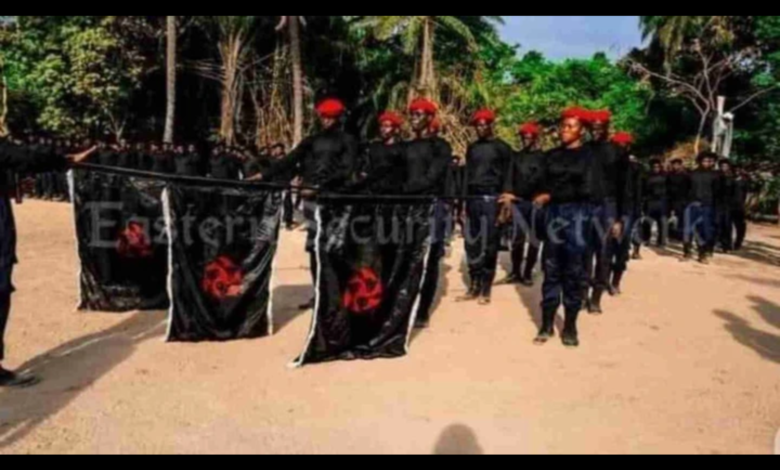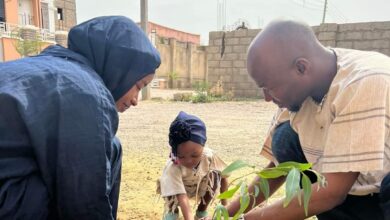IPOB Steps In As Govt Fails To Tackle Crimes In Southern Nigeria

The Indigenous People of Biafra (IPOB), on Sunday, Dec 13, announced the inauguration of Eastern Security Network (ESN), a vigilante group set up to ward off attacks from herdsmen and other security challenges faced in the Southeast and South-South regions.
In a statement, IPOB’s Media And Publicity Secretary, Emma Powerful, said the security network was not an army but a vigilante group, likening it to Miyetti Allah in the north and Amotekun, a regional security outfit recently launched by state governments in the Southwest geopolitical zone.
Powerful described ESN as a child of necessity established to protect forests and farmlands as well as “halt every criminal activity and terrorists’ attack in Biafraland”.
“We have decided not to wait endlessly while our mothers and sisters are continually raped and slaughtered like fowls by terrorists in our land. We can’t watch helplessly while those we are agitating to liberate from bondage are gradually being eliminated by terrorists,” he stated.
“Fulani herdsmen attack on our mothers and sisters must stop in our land with immediate effect. Unnecessary police brutality on innocent citizens also must stop. Police and Army checkpoints which have since been converted to extortion points should be dismantled.”
Marauding herdsmen have turned parts of arable farmland in the Southeast and South-South to both grazing fields in the last decade, with their activities leading to several reported killings.
This has created apathy and fear among locals such that they have abandoned their farms for fear of losing their crops to cow-grazing or being raped, maimed or killed in the farm.
In July, Agnes Okekpe, a middle-aged woman from Abakaliki Local Government Area, Ebonyi, was confirmed dead after weeks of suffering from complications of rape.
Okekpe was working on a piece of farm in the Ebenebe community of Awka North Local Government Area in Anambra as a labourer late 2019 when she was attacked. Suspected herdsmen who went into the farm with a herd of cattle allegedly gang-raped her until she lost consciousness.
Confirming the report, Paul Nnatuanya, President General of Ebenebe, said the woman’s ordeal was a common occurrence his people had been experiencing, in addition to the destruction of farmlands by suspected herdsmen.
“The information we got from Ebonyi State was that Agnes has died. She was raped to coma, our people took her to the hospital where she was revived. She died as a result of the trauma she suffered,” Nnatuanya said.
“After she was discharged from the hospital, she travelled back to her place in Ebonyi State; perhaps, to continue treatment there. The herdsmen also took the money the woman tied on her wrapper and it was the victim’s colleague that ran back to the town to alert the residents, who found her lying helplessly on the farm.
“When the villagers stormed the scene, she was already lying unconscious on the ground,” he added.
In Enugu State, herdsmen attacked a commercial bus carrying traders, mainly women returning from the market along Agbani-Ugbawka road in Nkanu East Local Government Area. They also abducted three young women after they had robbed the traders during the attack that took place on June 14, 2019.
“These herdsmen also butchered a whole family and a Catholic seminarian on apostolic work in Nkanu,” Chief Emeka Diwe President General of South East Town Unions lamented.
Continuing, Diwe said herdsmen attacked a farmers’ settlement in Anambra West Council of Anambra State on April 6, 2019, set the farm houses ablaze, killed the men, and raped the women they captured without resistance.
In Imo, herdsmen unleashed terror in Oguta, Ohaji-Egbema and Orlu as well as other parts of the state. The recent killing of Ozoemena Iriaka from Umuekpu in Agwa community in Oguta Local Government Area added to the long list of murders carried out by suspected herders.
The murderous activities are also rampant in the South-South, where some people have had to flee their ancestral homes.
In Delta State, residents of Okpanam community in Oshimili North Local Government Area, fled their community in May this year following worsening insecurity, which culminated in the killing of the chairman and secretary of the town’s Vigilante Group, Emeka Nwaedozie and Festus Monye, by suspected herdsmen.
Onwuegbuna Chiemelu, an indigene of the town, said over 70 families deserted Nnemiyi Estate, Okpanam during the weekend of the attack.
In the words of Mr Emeka Nwaedozie, chairman of the Community Vigilante Group, the situation has overwhelmed them to the point of confusion.
“We are saying that Fulani should be dislodged from the bush where they are residing and any of them who wants to live in Ibusa should come into the community and rent house like every other person,” he suggested.
“They should not have a camp there anymore. It is a security threat to us my wife and children have ran away, I do not sleep well.”
Paulinus Ezeokafor, the Catholic Bishop of Awka Diocese in Anambra State, has linked the activities of herdsmen and the destruction of farmlands to reduced agricultural productivity in the region.
“We condemn the killing and harassment of innocent citizens in their farms in some agro communities across the country, some of them are now scared of going to their farms to avoid being murdered by killer herders,” Ezeokafor said.
“Over the years, penetrators of these regular heinous crimes had executed their deadly mission without any form of resistance or being arrested by the nation’s security forces. Unlike armed robbers and financial criminals who got arrested and prosecuted in courts, these marauders have not been successfully prosecuted in any known court.”
The adoption of a community policing model in the Southeast had not mitigated the rising insecurity.
States in the region had come up with policies aimed at reducing the conflict between farmers and herders including monetary compensation for either parties in the event of destruction of farm or loss of cattle.
In some states, money is also paid to compensate families that lose their loved ones to attacks. But apart from not being effective, some people argue that the state governors had not demonstrated enough zeal to protect their citizens.
Diwe, the PG of ASETU[b], expressed frustration about what he considered conspiracy of silence over the destruction of livelihood and killing of the people in the Southeast.
“Despite these atrocious acts, the authorities have looked the other way, when citizens of Nigeria are slaughtered in cold blood and the authorities look the other way, it is a violation of those charters of peace.
“For about a decade, our people have endured the agony of murder, rape and molestation in the hands of killer herdsmen,” he said.
These are some of the reasons IPOB claimed it formed the ESN.
ESN’s presence has not been felt in the streets outside the social media videos and grandstanding where it was launched and celebrated. This is unlike recognised regional security outfits in other parts of the country.
The formation of ESN was greeted with mixed feelings. While many residents felt it was a welcome development that had been long-awaited, political leaders especially state governors described it as a distraction.
Dave Umahi, the governor of Ebonyi State and chairman of Southeast Governors Forum, in a recent statement dismissed the security outfit as laughable. According to him, the region remains the safest.
“It is very laughable and should be ignored, I commend the Southeast governors very highly. It is only the Southeast that the leaders are being criticized openly. I want them to ignore the side distractions,” he said.
On their part, Afenifere, a prominent Yoruba socio-cultural group expressed support for IPOB on the new security network.
Yinka Odumakin, the spokesman of Afenifere, said the distorted federal police could no longer secure the country, hence the establishment of regional security outfits to protect lives and property.
According to Odumakin, “It is seen that the central policing in Nigeria has collapsed, and the regional policing is not a new thing in this country. And, I tell you, we are back to the era of regional policing.”
“The security challenges have gone beyond what the Nigeria police can handle, and since we have had regional policing before, we are back into the era again. Kanu is doing what is good for his region,” he was quoted as saying.
As the debate over the legality and propriety of IPOB’s ESN rages, one fact many do not contest is that the people of the Southeast and South South regions need special security protection from repeated attacks by herdsmen.
Support Our Journalism
There are millions of ordinary people affected by conflict in Africa whose stories are missing in the mainstream media. HumAngle is determined to tell those challenging and under-reported stories, hoping that the people impacted by these conflicts will find the safety and security they deserve.
To ensure that we continue to provide public service coverage, we have a small favour to ask you. We want you to be part of our journalistic endeavour by contributing a token to us.
Your donation will further promote a robust, free, and independent media.
Donate Here





